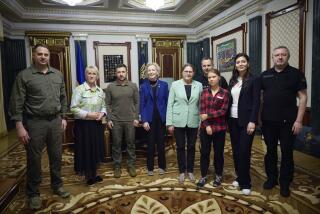Global Teamwork at Sundance
- Share via
A glimpse of what it is going to take to soften the blows that billions of humans and their machines deliver to their Earth each day emerged from a mountain retreat in Utah last week.
One thing it will take, at a minimum, is cooperation on environmental problems among nations and peoples who have little in common, at least politically, except for the planet they live on. After three days of meetings, more than 200 Soviet and American scientists, politicians, businessmen and others concerned with the environment urged their governments to get together on the task of stopping the Earth from overheating due to the greenhouse effect.
They asked President Bush and Soviet President Mikhail S. Gorbachev to form an “environmental security alliance.” As Roald Z. Sagdeev, one of the Soviet Union’s top space scientists and an elected member of his country’s new parliament, the Supreme Soviet, put it: “The issue of global survival should be elevated to the level of nuclear survival.” The group was brought together by actor Robert Redford at his retreat in Sundance.
The greenhouse effect results from an envelope of carbon dioxide and other gases--created largely by the burning of fossil fuels--that has sealed itself around the planet and is trapping warm air, which historically had cooled off in outer space. Scientists agree that the warming trend is real. What they do not yet know is how high temperatures will rise and how much flooding those higher temperatures will cause along the earth’s shorelines.
The Sundance meeting was the sort of thing that David McClave of the Library of Congress urged in one of a series of papers that the Johns Hopkins Institute published last year. The Soviet Union is the world’s largest country and the United States the fourth largest, so the way that they manage their environments has an effect on people far beyond their borders.
That would be particularly true of the greenhouse effect, according to McClave’s statistics, because they account, between them, for 40% of the carbon dioxide created by burning fuels that makes its way into the greenhouse envelope.
A glimpse of barriers to global cooperation on the environment also emerged. Sagdeev, for example, said that many Soviet citizens don’t see how global warming could hurt the frozen regions of Siberia with food production so important.
Third World nations do not look kindly on what they see as moves by the industrial world to throttle back on energy production just as the Third World seems poised to catch up in such luxuries as refrigeration and transportation.
But a separate report from Sundance also made it clear that the world has no choice but to try. “Soviet and U.S. scientists agreed that continued buildup of greenhouse gases at present rates will ensure that global temperatures rise before the middle of the next century above anything in human history.”
More to Read
Sign up for Essential California
The most important California stories and recommendations in your inbox every morning.
You may occasionally receive promotional content from the Los Angeles Times.













